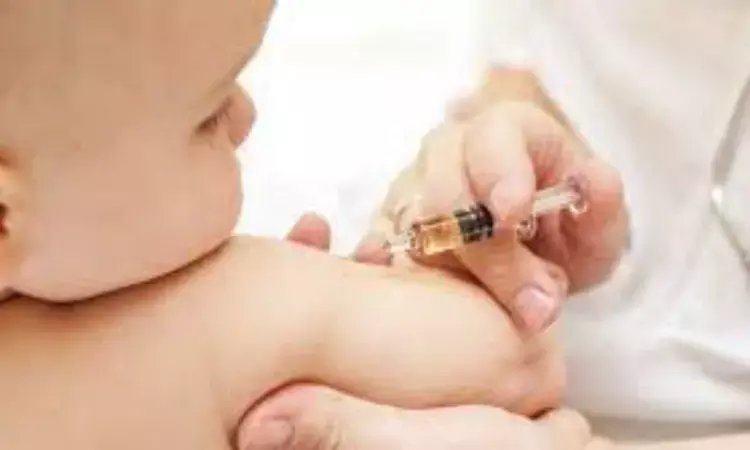- Home
- Medical news & Guidelines
- Anesthesiology
- Cardiology and CTVS
- Critical Care
- Dentistry
- Dermatology
- Diabetes and Endocrinology
- ENT
- Gastroenterology
- Medicine
- Nephrology
- Neurology
- Obstretics-Gynaecology
- Oncology
- Ophthalmology
- Orthopaedics
- Pediatrics-Neonatology
- Psychiatry
- Pulmonology
- Radiology
- Surgery
- Urology
- Laboratory Medicine
- Diet
- Nursing
- Paramedical
- Physiotherapy
- Health news
- Fact Check
- Bone Health Fact Check
- Brain Health Fact Check
- Cancer Related Fact Check
- Child Care Fact Check
- Dental and oral health fact check
- Diabetes and metabolic health fact check
- Diet and Nutrition Fact Check
- Eye and ENT Care Fact Check
- Fitness fact check
- Gut health fact check
- Heart health fact check
- Kidney health fact check
- Medical education fact check
- Men's health fact check
- Respiratory fact check
- Skin and hair care fact check
- Vaccine and Immunization fact check
- Women's health fact check
- AYUSH
- State News
- Andaman and Nicobar Islands
- Andhra Pradesh
- Arunachal Pradesh
- Assam
- Bihar
- Chandigarh
- Chattisgarh
- Dadra and Nagar Haveli
- Daman and Diu
- Delhi
- Goa
- Gujarat
- Haryana
- Himachal Pradesh
- Jammu & Kashmir
- Jharkhand
- Karnataka
- Kerala
- Ladakh
- Lakshadweep
- Madhya Pradesh
- Maharashtra
- Manipur
- Meghalaya
- Mizoram
- Nagaland
- Odisha
- Puducherry
- Punjab
- Rajasthan
- Sikkim
- Tamil Nadu
- Telangana
- Tripura
- Uttar Pradesh
- Uttrakhand
- West Bengal
- Medical Education
- Industry
Childhood vaccinations not related to risk of type 1 diabetes: Study

USA: A recent study in the journal Pediatrics has found no evidence that routine childhood immunization schedule is associated with an increased risk of type 1 diabetes. The study adds to the previous studies by providing data on newer vaccines, including acellular pertussis, hepatitis B, and varicella vaccines.
For the old vaccines, the researchers add that their results are in agreement with previous studies in not discovering any increased risks. Ours is the first epidemiologic study to evaluate the possibility that the timing of vaccination is related to the risk of clinical diabetes in children, they note.
Frank DeStefano, National Immunization Program, Centers for Disease Control and Prevention, Atlanta, Georgia, and colleagues conducted the study with an objective to evaluate suggested associations between childhood vaccinations, particularly against hepatitis B and Haemophilus influenzae type b, and risk of developing type 1 diabetes; and to determine whether the timing of vaccination influences risk.
For this purpose, they conducted a case-control study within 4 health maintenance organizations (HMOs) that participate in the Vaccine Safety Datalink project of the Centers for Disease Control and Prevention. It included children who met the following criteria: 1) born during 1988 through 1997; 2) HMO member since birth; 3) continuously enrolled for first 6 months of life; and 4) at least 12 months of HMO membership before diabetes incidence date (or index date for controls) unless incidence date was before 12 months of age.
All 4 HMOs maintain registries of their members who have diabetes, and the researchers used the registries for identifying potential diabetes cases. Chart reviews were conducted to verify that potential cases met the World Health Organization epidemiologic case definition for type 1 diabetes mellitus. The incidence date of diabetes was defined as the first date that the child received a diagnosis of diabetes. The researchers attempted to match 3 controls to each case. Controls had the same eligibility criteria as ca ses and were matched to individual cases on HMO, sex, date of birth (within 7 days), and length of health plan enrollment (up to the incidence or index date). The index date for controls was defined as the incidence date of the case to which the control was matched.
Two hundred fifty-two confirmed cases of diabetes and 768 matched controls met the study eligibility criteria.
The study yielded the following findings:
- The OR for the association with type 1 diabetes was 0.28 for whole cell pertussis vaccine (predominantly in combination as diphtheria, tetanus toxoids and pertussis vaccine), 1.36 for measles-mumps-rubella, 1.14 for Haemophilus influenzae type b, 0.81 for hepatitis B vaccine, 1.16 for varicella vaccine, and 0.92 for acellular pertussis-containing vaccines.
- Compared with children who had not received hepatitis B vaccine, the OR of diabetes was 0.51 for children vaccinated at birth and 0.86 for those first vaccinated against hepatitis B at 2 months of age or later.
- Race and ethnicity and family history of diabetes were independently associated with risk of type 1 diabetes, but adjustment for these factors did not materially alter the ORs for any of the vaccines.
"Our results on hepatitis B vaccine do not support the hypothesis; risk of type 1 diabetes was not different between infants vaccinated at birth and those who received their first vaccination later in life," wrote the authors.
"The results of our study and the preponderance of epidemiologic evidence do not support an association between any of the recommended childhood vaccines and an increased risk of type 1 diabetes. Suggestions that diabetes risk in humans may be altered by changes in the timing of vaccinations also are unfounded."
Reference:
The study titled, "Childhood Vaccinations, Vaccination Timing, and Risk of Type 1 Diabetes Mellitus," was published online in the journal Pediatrics.
DOI: https://publications.aap.org/pediatrics/article-abstract/108/6/e112/63616/Childhood-Vaccinations-Vaccination-Timing-and-Risk
Dr Kamal Kant Kohli-MBBS, DTCD- a chest specialist with more than 30 years of practice and a flair for writing clinical articles, Dr Kamal Kant Kohli joined Medical Dialogues as a Chief Editor of Medical News. Besides writing articles, as an editor, he proofreads and verifies all the medical content published on Medical Dialogues including those coming from journals, studies,medical conferences,guidelines etc. Email: drkohli@medicaldialogues.in. Contact no. 011-43720751


